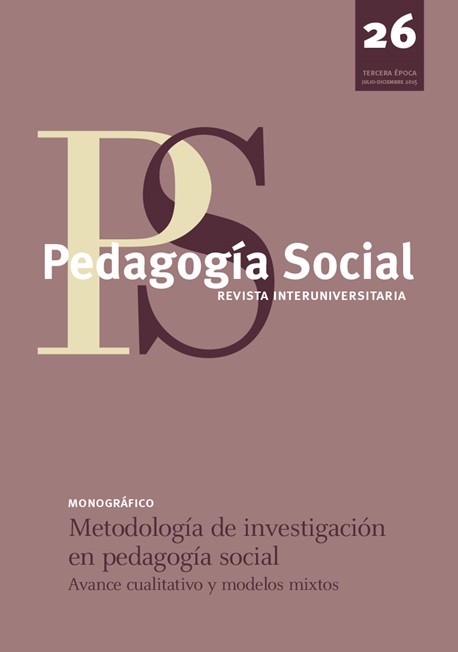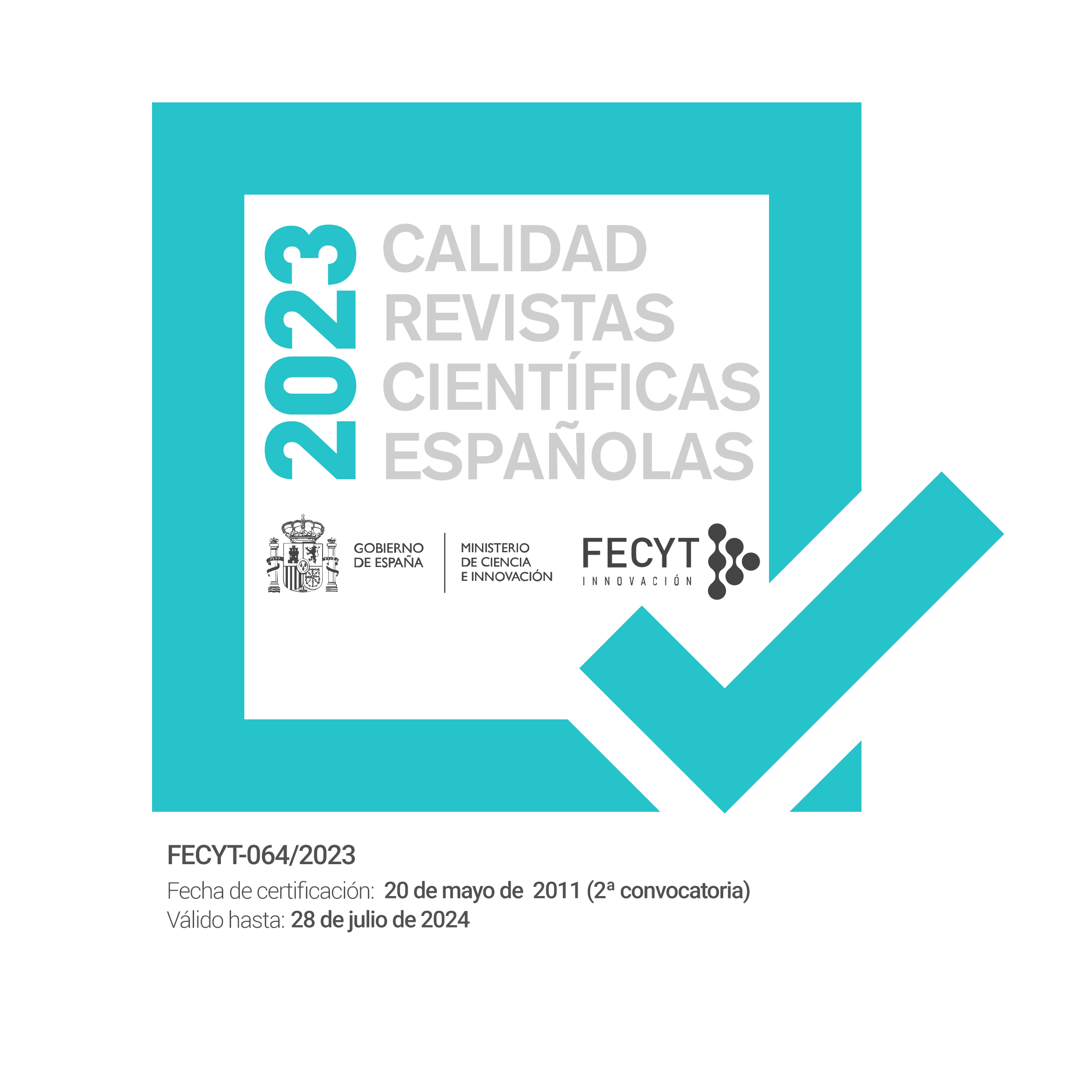The vision of immigrant students about key factors and skills for access to college
DOI:
https://doi.org/10.7179/PSRI_2015.26.10Keywords:
Immigrants, Family, Academic AchievementAbstract
One of the most important challenges in education is working against absenteeism and school dropout. Especially relevant is the case of immigrant students who are a vulnerable group, fact that causes a high difference in results between immigrants and native students, so that only a very small percentage reaches college.
For this reason, the study “Competencies and keys for an educational success from the perspective of college students’ children of immigrants” (2009 ARAF1 00010) has sought to identify the key factors and skills that college students from immigrant families in Catalonia (Spain) feel have been useful for their educational success, educational success seen as the enrolment in programs beyond compulsory education.
The study methodology has been predominantly qualitative using three different sources of data collection: life stories, audiovisual narratives and questionnaires. Specifically for this article we refer to the results analyzed through the life stories of 13 college students from immigrant backgrounds who had done all or part of their primary school in the Spanish education system, considering for their selecting the age of arrival, their nationality and the variety of universities and degrees where they were enrolled.
The results of the study support the findings of previous researches (Aja et al.; Huguet & Navarro, 2006; Ferrer, 2009; OECD, 2010; Instituto de Evaluación, 2010). Student participants have referred to the importance of family expectations and support, especially when it has been given in conjunction with the school. They especially emphasized the role of mothers as a basic figure to encourage perseverance and dedication to studies. Moreover, in the educational environment it has been particularly appreciated the role the high school teachers who in many cases were the key on having great expectations for them and communicating these explicitly. Finally, regarding the competences, which have been the focus of our analysis, the intrapersonal and the self-confidence competences are the skills that students consider basic to overcome, as indicated by studies about resilience, adverse contexts and conditions.
Downloads
References
Aja, E. D., Essomba, P., Formariz, M.A., & Girona, A. (2000). Educació i immigració. Els reptes educatius de la diversitat cultural i l’exclusió social. Barcelona: Editorial Mediterrània
Alarcón, A. (2007). Joves d’origen immigrant a Catalunya. Necessitats i demandes. Una aproximació sociológica. Barcelona: Fundació Jaume Bofill.
Aldous, J. (2006). Family, Ethnicity and Immigrant Youths’ Educational Achievements. Journal of Family Issues, 27 (12), 1633-1667.
Alegre Canosa, M. A. (2005). Educació i immigració: l’acollida als centres educatius. Barcelona: Editorial Mediterrània.
Alegre, M. A., Benito, R., & González, S. (2006). Immigrants als instituts. L’acollida vista pels seus protagonistes. Barcelona: Editorial Mediterrània.
Aparicio, R., & Tornos, A. (2006). Hijos de inmigrantes que se hacen adultos: Marroquíes, dominicanos, peruanos. Documentos de Observatorio Permanente de la Inmigración, 8.
Arnaiz, P., & De Haro, R. (2004). Ciudadanía e interculturalidad: claves para la educación del siglo XXI. Educatio Siglo XXI, Retrieved from http://revistas.um.es/educatio/article/view/97
Besalú, X., & Vila, I. (2007). La buena educación: libertad e igualdad en la escuela del siglo XXI. Barcelona: La Catarata.
Calero, J. (Coord.) (2006). El rendimiento educativo del alumnado inmigrante analizado a través de PISA 2006. Madrid: Estudios CREADE.
CIDE-MEC (2005). La atención al alumnado inmigrante en el sistema educativo en España. Madrid: CIDE-MEC.
Comisión Europea (2010). Europa 2020. Estrategia para un crecimiento Inteligente, Sostenible e Integrador. Bruselas: COM.
Crosnoe, R., & López, R.N. (2011). K-12 Educational Outcomes of Immigrant Youth. Future of children, 21 (1), 129-152.
Enriquez, L.E. (2011). Because We Feel the Pressure and We Also Feel the Support”: Examining the Educational Success of Undocumented Immigrant Latina/o Students. Harvard Educational Review, 81 (3), 476-499.
Escamilla, A, (2008). Concepto y funciones de las competencias básicas. Bases para su desarrollo en los centros. Librosvivos. Net
Estellés, P. (Coord.) (2012). El fracàs escolar a Catalunya. Informe FEDAIA. Barcelona: FEDAIA.
Ferrer, F. (Dir.) (2009). Equitat, excel.lència i eficència educativa a Catalunya. Una anàlisi comparada. Barcelona: Editorial Mediterrània/ Fundació Bofill.
Generalitat de Catalunya (2005). Pla de Ciutadania i immigració 2005 – 2008. Barcelona: Generalitat de Catalunya.
Generalitat de Catalunya (2010). Pla de Ciutadania i Immigració 2009 – 2012. Barcelona: Generalitat de Catalunya.
Huguet, A. & Navarro, J. (2006). Inmigración y resultados escolares: lo que dicen las investigaciones. Cultura y Educación, 18, 117-126.
Instituto de Evaluación (2010). PISA 2009. Informe español. Madrid: Ministerio de Educación.
Mari-Klose, P., Mari-Klose, M., Vaquera, E. & Cunningham, S.A. (2010). Infancia y futuro. Nuevas realidades, nuevos retos. Colección Estudios Sociales, 30.
Monereo, C. (Coord.) (2009). PISA como excusa: repensar la evaluación para cambiar la enseñanza. Barcelona: Graó.
Murillo, F. J. (2005). La investigación sobre eficacia escolar. Barcelona: Octaedro.
Navarrete, L. (2007). Jóvenes y Fracaso escolar en España. Madrid: Instituto de Juventud (INJUVE).
OECD (1998). Overcoming Failure at School. Paris: OECD.
OECD (2010). PISA 2009 Results: Overcoming social background – equity in learning opportunities and outcomes (volume II). Paris: OECD. doi: 10.1787/9789264091504-en
Orfield, G. (2001). Schools more separate. Consequences of a Decade of resegregation. Cambridge (MA): Harvard Civil Rights Project.
Oseguera, L., Conchas, G.Q., & Mosqueda, E. (2011). Beyond Family and Ethnic Culture: Understanding the Preconditions for the Potencial Realization of Social Capital. Youth & Society, 43 (3), 1136-1166.
Serra, C., & Palaudàrias, J.M. (2010). Continuar o abandonar. L’alumnat estranger a l’educació secundària. Barcelona: Fundació Jaume Bofill.
Suárez Orozco, C. & Suárez Orozco, M. (1995). Transformations: immigration, family, life and achievement motivation among Latino adolescents. Stanford: Stanford University Press.
Truñó, M. (2012). Infància a Catalunya. Barcelona: UNICEF Comitè Catalunya.
Yeung, A.S. & McInerney, D.M. (2005). Student’s School Motivation and Aspiration Over High School Years. Educational Psychology, 25 (5), 537-554.
Zimmerman, B. J. (2008). Investigating Self-Regulation and Motivation: Historical Background, Methodological Developments, and Future Prospects. American Educational Research Journal, 45 (1), 166-183.
Downloads
Additional Files
Published
Issue
Section
License
Copyright (c) 2015 Pedagogia Social. Revista Interuniversitaria

This work is licensed under a Creative Commons Attribution-NonCommercial 3.0 Unported License.
Copyright and right to archive
The published version of the articles can be self-archived by their authors in open access institutional and thematic repositories. However, Pedagogía Social. Revista Interuniversitaria must authorize partial or global reutilisation on new papers or publications.
Published papers must be cited including the title of the journal Pedagogía Social. Revista Interuniversitaria, issue, pages and year of publication
Ethical responsibilities
Pedagogía Social. Revista Interuniversitaria does not accept any material that has been previously published in other documents or publications. Authors are responsible for obtaining the required permissions for partial or global reproduction any material from other publications, and to correctly quote its origin.
Pedagogía Social. Revista Interuniversitaria is obliged to detect and report fraudulent practices.
Only those who have intellectually contribute to the development of the paper must appear as authors.
The journal expects authors to declare any commercial partnership that might entail a conflict of interest with respect to the submitted article.
Authors must mention in the article, preferably in the “methodology” section, that the procedures used during the samplings and controls have been made after getting informed consent.
The journal will not use any received contribution in a way other than the goals described in these guidelines.
Copyright Notice
© Pedagogía Social. Revista Interuniversitaria. Papers published in both the printed and online versions of this Journal are property of Pedagogia Social. Revista Interuniversitaria, being required to cite the source in any partial or total reproduction.
Unless otherwise stated, all content of this electronic journal is distributed under "Creative Commons Attribution-Non commercial 3.0 Spain" (CC-by-nc) license for use and distribution. The informative version and the legal text of this license is available here. This has to be expressly stated in this way when necessary.





